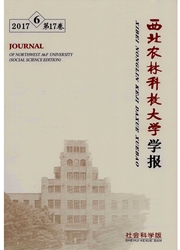

 中文摘要:
中文摘要:
从制度约束和行为变迁的视角出发,构建一个乡村人居环境演变的理论框架,即从外部和内部两个维度来考察乡村人居环境演变。外部维度是指国家制度约束,乡村人居环境建设是在国家制度主导下发展的;而内部维度就是农户空间行为,即乡村人居环境建设的内生变量,包括农户的居住、就业、消费和交往等空间行为。乡村人居环境正是在国家制度主导和空间行为双重因素的作用下发展的。对中国改革开放以来的乡村人居环境演变进行了总结和反思,认为不同的制度安排背景下,农户空间行为特征、乡村人居环境演变动力及其效应存在较大差异;乡村人居环境建设过程的空间问题一直无法实现预期目标,需要我们给予反思和调整。
 英文摘要:
英文摘要:
This article tries to construct a theoreticat framework of rural human settlement evolution from the perspective of institutional constraints and behavior changes, which is investigating the rural human settlement e- volution from two dimensions of internal and external factors. External dimension means institutional constraints from the state, as rural human settlement construction is led by state institutions. Internal dimension means house- holds' spatial behaviors, which are the endogenous variables of rural human settlement construction. Households' spatial behaviors include living spatial behavior, employment spatial behavior, consumption spatial behavior and human communication spatial behavior. Rural human settlement is developing under the effects of state institutions and spatial behaviors. This article summarizes and rethinks the evolution of rural human settlement since China' s reform and opening up. It is concluded that there are large differences among households' spatial behavior charac- teristics, evolution power of rural human settlement and their effects in different institutional arrangement. We should rethink and pay attention to the spatial problems in the process of rural human settlement construction which has failed to achieve the goal since long.
 同期刊论文项目
同期刊论文项目
 同项目期刊论文
同项目期刊论文
 期刊信息
期刊信息
